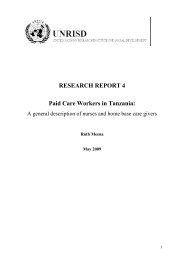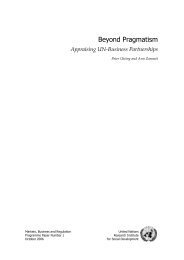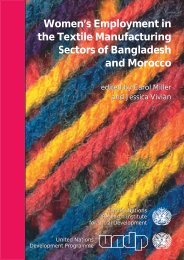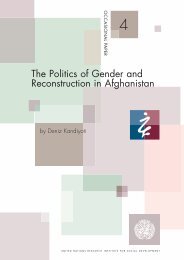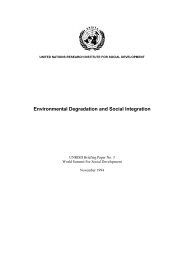communicating in the information society - United Nations Research ...
communicating in the information society - United Nations Research ...
communicating in the information society - United Nations Research ...
Create successful ePaper yourself
Turn your PDF publications into a flip-book with our unique Google optimized e-Paper software.
Introduction<br />
contradictory evolv<strong>in</strong>g relationships between scientists, <strong>the</strong> creation of<br />
symbolic values, <strong>the</strong> <strong>in</strong>stitutions that translate <strong>in</strong>to various rewards,<br />
librarians, and, at <strong>the</strong> fulcrum, commercial publishers. He identifies how<br />
s<strong>in</strong>ce <strong>the</strong> late 1960s, a narrow, conventional and profit-maximiz<strong>in</strong>g trend<br />
has created an <strong>in</strong>stitutional elite and highly profitable bus<strong>in</strong>ess through<br />
ever more tightly policed gateways for access<strong>in</strong>g scientific knowledge.<br />
Digitization threatens to change that, but <strong>the</strong> question is whe<strong>the</strong>r it will<br />
be for better or worse. Aga<strong>in</strong>st <strong>the</strong> traditional approach that would<br />
deepen control is a free or open-access approach promoted by civil<br />
<strong>society</strong>. Simplify<strong>in</strong>g a nuanced argument, such an approach requires a<br />
susta<strong>in</strong>able model—which implies some borrow<strong>in</strong>g from <strong>the</strong> “bus<strong>in</strong>ess”<br />
approach to <strong>the</strong> <strong>in</strong>formation <strong>society</strong> and an alliance with more<br />
progressive publishers. The plot thickens fur<strong>the</strong>r when he generalizes<br />
<strong>the</strong> argument to <strong>the</strong> area of free and open source software, and to<br />
discussion of <strong>the</strong> commons and <strong>the</strong> public doma<strong>in</strong> <strong>in</strong> general. This <strong>in</strong> turn<br />
leads to <strong>the</strong> claim that draw<strong>in</strong>g a clear dist<strong>in</strong>ction between <strong>in</strong>frastructure<br />
provision and service activities, and develop<strong>in</strong>g strategies around it, is<br />
more fundamental than <strong>the</strong> commercial/non-profit dichotomy. His<br />
ultimate conclusion (hence we can decipher <strong>the</strong> title of his contribution)<br />
is that <strong>the</strong> tendency of <strong>the</strong> phrase <strong>in</strong>formation <strong>society</strong> to convey <strong>the</strong> idea<br />
that social problems are best resolved “scientifically”—away from <strong>the</strong><br />
fray of politics—must be overturned, and that civil <strong>society</strong>, with its focus<br />
firmly on <strong>the</strong> social and political, is best placed to lead this. The capacity<br />
of civil <strong>society</strong> to network <strong>in</strong> a distributed manner is what is needed to<br />
exploit <strong>the</strong> fullest potential of <strong>the</strong> <strong>in</strong>formation <strong>society</strong>.<br />
F<strong>in</strong>ally, pos<strong>in</strong>g as a (highly select) glossary of <strong>the</strong> <strong>in</strong>formation<br />
<strong>society</strong>, Antonio Pasquali’s contribution returns from a different vantage<br />
po<strong>in</strong>t to many of <strong>the</strong> same po<strong>in</strong>ts. His first chosen term is “human<br />
relations”, an apparently self-explanatory term that he deploys to restate<br />
<strong>the</strong> need to resist <strong>the</strong> strong tendency of reduc<strong>in</strong>g <strong>the</strong> <strong>in</strong>formation <strong>society</strong><br />
to a purely technical or economic discourse. Tak<strong>in</strong>g us back to <strong>the</strong><br />
etymological roots <strong>in</strong> ancient history, he says: “The words communication<br />
or <strong>in</strong>formation always, and necessarily, refer to <strong>the</strong> essence of community<br />
and human relations”. If WSIS allies itself with <strong>the</strong> current trend of<br />
mov<strong>in</strong>g decision-mak<strong>in</strong>g powers from consensus-based bodies of <strong>the</strong><br />
<strong>United</strong> <strong>Nations</strong> <strong>in</strong>to power-based bodies such as <strong>the</strong> International<br />
Monetary Fund (IMF) and World Bank—and it seems set to—<strong>the</strong>n that<br />
key doma<strong>in</strong> will favour technological and economic, ra<strong>the</strong>r than social,<br />
approaches to issues. He rescues o<strong>the</strong>r terms from <strong>the</strong>ir vague and<br />
ambiguous usages which suit discourse that reduces social development<br />
to a technical matter. In argu<strong>in</strong>g for rigorous and judicious use of<br />
“deontologies”, “morals” and “ethics”, he is at <strong>the</strong> same time lay<strong>in</strong>g <strong>the</strong><br />
groundwork for a rights-based approach. Then he tackles “<strong>in</strong>form<strong>in</strong>g”<br />
and “<strong>communicat<strong>in</strong>g</strong>” toge<strong>the</strong>r, conclud<strong>in</strong>g that while <strong>the</strong>y are<br />
9




